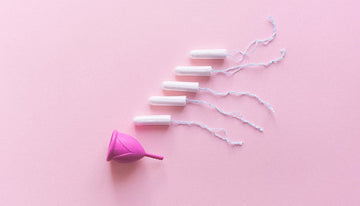
Pad or tampons? A question, we as people who menstruate in India were never asked. It was always assumed that if we start our periods, we would be using pads. Tampons were out of the question. They are invasive, they could get lost, there’s something too sexual about them. Myth. All of it is myth.
Why are we unaware of one of the greatest alternatives used by the majority of people in the Western Hemisphere? Why are we continuing to bear rashes that are often associated with usage of pads?
Have you ever come across an advertisement containing tampons on Indian television? Nope. But have you seen multiple advertisements on pads? Yes! All the time. Let's say that some of us are aware of tampons, but why is there a stigma revolving around it in India?
Since, menstruation or periods itself are considered a taboo in India, it is believed that tampons have something to do with the person’s virginity. Something that the Indian society is very keen on protecting. The second misconception would be that tampons hurt or cause more discomfort and infections than regular pads.
So let’s begin this journey by understanding what tampons really are.
A tampon is a female menstrual hygiene product that resembles a small cotton stick, created to absorb blood during periods by inserting it into the vagina. Unlike a pad, a tampon is inserted internally, inside the vagina, which can be a scary thought for many. Once inserted inside, the tampon holds its position inside with the help of vaginal muscles. The tampon expands as it soaks up the blood during a period.
Most of the tampons in the market are made of a material called rayon, a mix of rayon and cotton, or synthetic fibers. Some tampons are made out of organic cotton that are available in varying absorbency levels.
Commonly, tampons sold in the market are made of rayon, cotton and rayon blend and some synthetic fibers. These are the types of tampons that are sold and marketed widely. However, the lesser known ones are tampons made of organic cotton. Lemme Be’s organic tampons are breathable, hypoallergenic and super absorbent, making your period rash-free and comfortable.
A major deterrent of using tampons is TSS or Toxic Shock Syndrome. Apart from the menstrual blood, tampons also absorb the vagina's natural secretions and lubrication which have good bacteria. This can tamper the normal pH, increasing the risk of infections. TSS is a rare occurrence but could become a serious infection that requires timely medical attention but can be avoided using the guidelines and maintaining good hygiene.
To use tampons safely, you must follow the simple and basic guidelines to maintain hygiene and safety:
- Pick the lowest absorbency required for your flow
- Follow the directions and guidelines on the package for insertion and tampon usage
- Change the tampon every 6 to 8 hours or more often depending on your flow
- Use tampons and pads alternatively
- Avoid wearing tampons overnight and sleeping
Contradicting some of the common myths with facts - if one maintains good and proper hygiene well in their daily lives and especially during menstruation, tampons serve a woman better in terms of causing any discomfort than regular pads.
Although choosing tampons over regular pads when it comes to Indian women will not be seen in the near future unless we are truly aware of the tampon taboo and stigmas around it, we still have a comparatively long way to go in terms of unashamedly purchasing our new pads by not having to wrap it in a newspaper.




